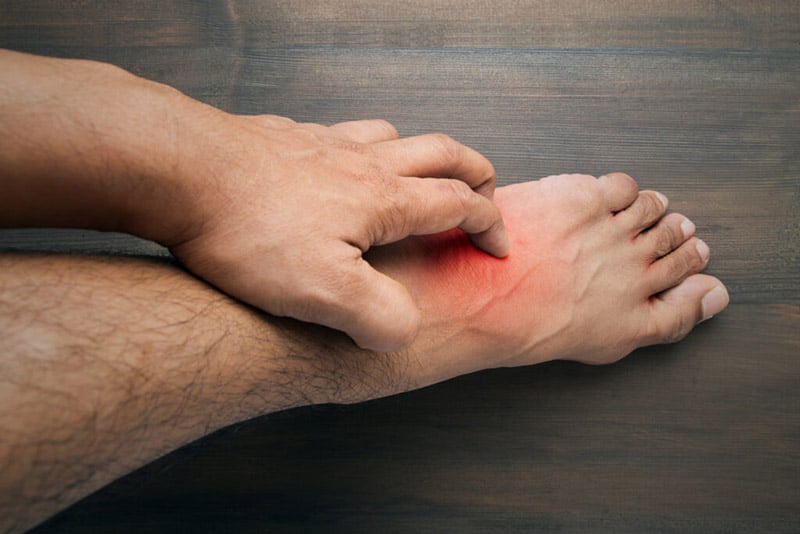Burning Feet
Burning feet refers to the sensation of your feet feeling painfully hot despite not being exposed to a source of heat. It’s a condition that can be the result of a number of different causes and give rise to symptoms that range from mild to severe discomfort.
The sensation can manifest across the whole of the foot and even the ankle and lower leg. It may also be accompanied by a variety of other symptoms, such as tingling and numbness. Burning feet at night is especially common, and this sort of hot feet syndrome can be either isolated or a sign of another underlying medical condition.
This page discusses several of the most common causes of burning feet, as well as the different symptoms you may experience. It then covers diagnosis and how you can treat burning pain in feet.
Symptoms of burning feet
Burning feet or hot feet syndrome is characterised by a burning sensation in legs and feet. It may feel as though your feet are painful and uncomfortably hot – like feet on fire – especially during the night. This pain might be constant or come and go at irregular intervals. It can be felt in an isolated area, such as stinging toes or as a broad burning sensation in legs and feet.
In addition to a burning sensation in feet, depending on the underlying cause, you may experience other symptoms in the affected area. These include:
- Tingling
- Numbness
- Itching
- Prickling
- Pins and needles
- Swelling
- Cracked, dry, or raw skin
Most of us have felt our heels burn after being on our feet all day or burning toes from exposure to very cold weather. However, burning feet is generally more severe and long-lasting or recurring than this and doesn’t have a clear explanation that you can easily point to.

Causes of burning feet
There are many different reasons why you might have hot feet at night or a burning sensation in feet. Many of these are related to nerve damage. However, this is not the only possible explanation. Below are some of the most common causes of burning feet.
Diabetes
Diabetes is a condition that can cause your blood sugar levels to become too high. Over time, this may cause damage to your blood vessels and nerves, which is known as diabetic neuropathy. Neuropathy can affect nerves all over the body, including the legs and feet – when it’s known as peripheral neuropathy. This may result in numbness or tingling as well as burning feet or a sensation that feels like you’re wearing tight socks.
Small fibre sensory neuropathy
Another type of neuropathy that can result in burning pain in toes and feet is small fibre sensory neuropathy (SFSN). This occurs when small fibres in the peripheral nervous system are damaged, which may be due to an underlying medical condition such as diabetes. Other symptoms include loss of sensation in the feet, tingling, and short bursts of pain – which may get worse over time.
Athlete’s foot
Also known as tinea pedis, athlete’s foot is a contagious fungal infection that’s common amongst athletes. You can catch it through contact with surfaces contaminated with the fungus, such as floors or towels, and are at higher risk if you have sweaty feet. Athlete’s foot affects the skin on your feet but can also spread to the toenails. Symptoms include the toes and soles of feet burning and itching, as well as skin that’s dry, cracked, raw, or peeling. The condition can be treated with anti-fungal medication.
Complex regional pain syndrome
CRPS is a rare condition in which unusually severe pain and inflammation occurs after an injury to a limb. If you’ve injured your leg or foot, there’s a chance this could be the reason behind your burning feet. Other symptoms can include hypersensitivity, a change in skin colour, and swelling.
Charcot-Marie-Tooth disease
CMT disease is an inherited peripheral nerve disorder that gets progressively worse over time. Burning feet can be an early sign of the condition, which may be followed by more severe symptoms such as muscle wastage and loss of sensation.
Erythromelalgia
One rare condition that can cause you to feel the bottom of feet red and burning is erythromelalgia. It can be as mild as a tingling sensation or as severe as painful burning feet, and usually flares up in sporadic episodes that last between a few minutes and several days. The condition may be triggered by an increase in body temperature and be accompanied by other symptoms such as redness, itching, and swelling.
Hypothyroidism
Having an underactive thyroid results in hormonal deficiencies that can cause a wide variety of symptoms, including fatigue and weight gain in addition to burning feet. The condition can be treated with medication.
Tarsal tunnel syndrome
Tarsal tunnel syndrome is caused by compression and damage to the posterior tibial nerve, which runs between the ankle and foot. This can result in a burning sensation in ankle and feeling of the soles of feet burning, as well as shooting pains and pins and needles. The condition can cause irreversible nerve damage if left untreated and, in severe cases, may require surgery.
Lifestyle factors
As well as medical conditions, there are certain lifestyle factors that may result in you feeling itchy hot feet at night or burning feet. For example:
- Heavy alcohol use over time can cause nerve damage known as alcoholic neuropathy, resulting in numbness, tingling, and burning feet
- Nerve damage can also be the result of nutritional deficiencies – particularly a lack of B vitamins – and cause burning feet in addition to symptoms such as fatigue and dizziness
Diagnosis of burning feet
If your feet itch and burn, it’s a good idea to see your doctor about it. They will be able to conduct a physical examination to check for issues such as infection, lack of sensation, and structural problems. If necessary, they might also want to test you for diabetes, vitamin deficiencies, and any other potential hot feet cause that seems likely.
The GP will ask questions about your medical history and lifestyle, in addition to the specific nature of your symptoms. Try to pin down the exact location and feeling, such as a burning sensation on top of foot or burning pain in arch of foot, as well as how long and frequently you experience it. The more accurate information you can provide, the better chance you have of getting an informed diagnosis for your burning feet.
Treatment for burning feet
The treatment that the doctor recommends for your burning feet will depend on the specific cause of your symptoms. For example, some of the recommendations could include:
- Using exfoliating socks such as Footner to get rid of dry and hard ski
- Wearing more comfortable and better-fitting shoes
- Taking vitamin B supplements to compensate for a deficiency
- Anti-fungal medications for athlete’s foot (either over the counter or prescription)
- Hormone replacement supplements for hypothyroidism
- Electrical nerve stimulation, magnetic therapy, or light therapy
- Painkillers to relieve your symptoms
- Acupuncture or acupressure
If you have diabetes, it’s important to eat healthily and take regular exercise to manage your condition and reduce the chances of experiencing complications such as burning feet.
Home remedies for burning feet
In addition to medical treatment, there are many natural home remedies you can try to alleviate the symptoms of burning feet. Bear in mind that they might not all be effective for you depending on the specific cause of your burning pain in toes or soles of feet burning, so it’s wise to visit your doctor for a diagnosis.
Some of the remedies that may be able to bring you relief from burning feet include:
- Soaking your feet in cold water for a few minutes (this is not recommended if you have erythromelalgia)
- Soaking your feet in warm water containing Epsom salts for about 30 minutes (this is not suitable for people with diabetes). This can help to exfoliate your skin and reduce your symptoms
- Resting your feet
- Massaging your feet to improve circulation and blood flow
- If you suffer from hot feet at night, you can try sleeping with your feet outside the covers with a fan pointed at them or wearing socks that you’ve chilled in the fridge
- Avoiding drinking too much alcohol
- Keeping active and eating a balanced diet
Burning feet FAQs
Why are my feet burning hot at night?
There are many different possible causes for having hot feet at night. However, one of the most common is neuropathy (nerve damage). This, in turn, can be the result of a number of factors, including vitamin deficiencies, chemotherapy, diabetes, alcohol misuse, and other underlying medical conditions.
Should I be worried about burning feet?
In many cases, burning feet are the result of a cause that is treatable or manageable. In fact, the symptoms may well disappear on their own. However, in some cases, hot feet syndrome can be a sign of an underlying health condition that you’re unaware of. As such, it’s important to book a doctor’s appointment so that you can have any necessary tests and receive an accurate diagnosis and treatment recommendations.
When should I see a doctor for burning feet?
It’s a good idea to see your doctor about a burning sensation in legs and feet if the symptoms do not clear up by themselves within a couple of days or if the feeling keeps coming back. It’s especially important to seek medical assistance if your symptoms are getting worse or spreading further, or if you are losing sensation in your feet or toes. Finally, if you suffer from diabetes and experience burning feet, you should book a doctor’s appointment.
How do I get my feet to stop burning?
The best way to stop your burning sensation in feet will depend on the exact cause. You may need to take medication or have some form of therapy. It might also be helpful to switch to more comfortable and supportive footwear or use insoles.
What is a natural remedy for burning feet?
Depending on the particular cause of your burning pain in feet, you might benefit from soaking your feet in cold water or in warm water that contains Epsom salts. Footner exfoliating socks can be great for getting rid of hard and dry skin, while massage can improve your circulation. Regardless of why your feet feel like feet on fire, eating a healthy diet and staying active are key.
If you specifically struggle with itchy hot feet at night, try wearing socks that have been cooled in the fridge or freezer, sleeping with your feet outside the covers and a fan pointed at them or using a hot water bottle filled with icy water.
Links & Sources
- www.webmd.com/diabetes/burning-feet-causes-treatments
- www.mayoclinic.org/symptoms/burning-feet/basics/when-to-see-doctor/sym-20050809
- www.healthline.com/health/burning-in-feet
- www.medicalnewstoday.com/articles/home-remedies-for-burning-feet
- www.nhs.uk/conditions/diabetes/
- www.healthline.com/health/small-fiber-neuropathy
- www.healthline.com/health/athletes-foot
- www.medicalnewstoday.com/articles/184338
- www.healthline.com/health/charcot-marie-tooth-disease
- www.nhs.uk/conditions/erythromelalgia/
- www.mayoclinic.org/diseases-conditions/hypothyroidism/symptoms-causes/syc-20350284
- www.healthline.com/health/tarsal-tunnel-syndrome
- www.healthline.com/health/alcoholism/alcoholic-neuropathy
- www.healthline.com/health/how-to-cool-down-hot-feet-at-night


